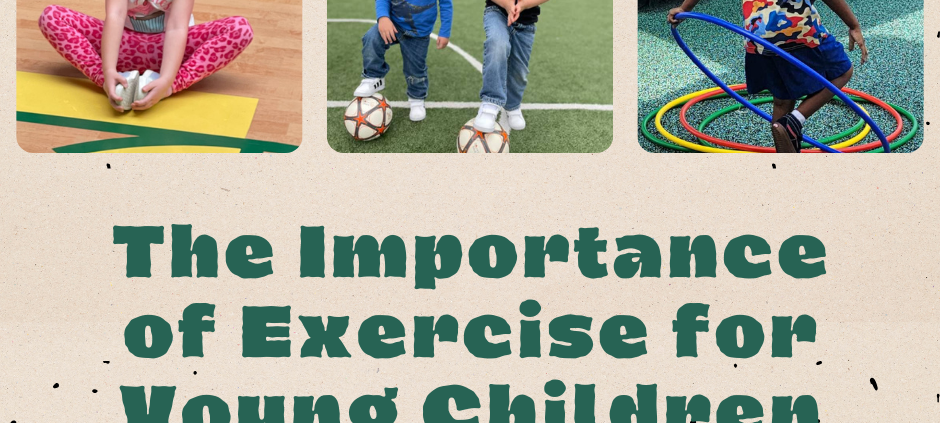The Importance of Exercise for Young Children
In a world that’s constantly moving, it’s easy to see how activity can sometimes get lost in the shuffle. However, physical exercise is essential for young children’s healthy development and well-being. Regular movement isn’t just about staying physically fit; it builds foundational skills that children will use for a lifetime. At Imagine Early Education and Childcare, we believe in making active play a key part of each day to nurture both bodies and minds. Here’s why exercise is so vital for young children and how it impacts them beyond the playground.
- Physical Health and Development
Regular physical activity promotes the growth of strong muscles, bones, and joints, setting the stage for long-term health.
When children engage in active play, they build muscle strength, improve cardiovascular health, and develop endurance and flexibility. Exercise also strengthens their bones, which are still growing and developing during early childhood. Developing these physical foundations now helps prevent health issues later in life, such as obesity, diabetes, and cardiovascular disease. Simply put, healthy habits learned early create a stronger, more resilient body.
- Supports Cognitive Development
Exercise has been shown to enhance brain function, improving children’s focus, memory, and problem-solving skills.
Physical activity increases blood flow to the brain, which helps boost cognitive function. Research shows that children who are regularly active tend to perform better in areas such as memory, attention, and academic skills. Movement also reinforces cognitive learning by engaging the brain’s pathways and helping children practice skills like balance, coordination, and spatial awareness, all of which are critical to early learning and development.
- Encourages Social Skills and Teamwork
When children play together, they practice sharing, taking turns, and communicating—essential skills that build empathy and teamwork.
Whether it’s a group game of tag or a simple relay race, physical activities with others teach children to cooperate, communicate, and resolve conflicts in a healthy way. These interactions help them understand the value of working together toward a common goal and give them the chance to practice social skills. Developing these abilities now creates a strong foundation for building friendships and succeeding in collaborative environments later.
- Improves Emotional Well-being
Exercise has a direct, positive impact on children’s moods, helping to reduce stress, anxiety, and even the effects of early childhood depression.
Movement boosts endorphins, the body’s natural mood lifters, which can help children feel happier and less stressed. Active play can also serve as an emotional outlet for kids, helping them express emotions like excitement, frustration, or even nervousness. When children have a daily opportunity to move and play, they build resilience, feel a greater sense of accomplishment, and gain confidence, which contributes to a healthier emotional outlook.
- Instills Lifelong Healthy Habits
Developing a love for physical activity early on helps children grow into healthy, active adults.
Introducing exercise as a fun, enjoyable part of the day sets children up with a positive attitude toward physical activity that they’ll carry with them into adulthood. When they see movement as fun and fulfilling, they’re more likely to stay active throughout their lives, which contributes to overall health and well-being. Establishing these habits early lays the groundwork for a lifetime of healthy choices and activity.
Fun Ways to Keep Your Child Active
Fostering an active lifestyle doesn’t have to be complicated; here are some simple, enjoyable ways to keep your child moving.
- Outdoor Play: Head to a local park, playground, or even your backyard for games like hide-and-seek, tag, or obstacle courses.
- Dance Party: Put on your child’s favorite songs and have a family dance party—it’s a great way to be active indoors and have fun together.
- Family Walks or Bike Rides: Explore your neighborhood with a walk, scooter, or bike ride. It’s a wonderful way to bond and be active together.
- Sports and Games: Try simple games like soccer, catch, or even jump rope. If your child is interested, consider enrolling them in an age-appropriate sports class.
At Imagine Early Education and Childcare, we incorporate physical activity into our daily routine, providing children with time to explore, play, and develop their motor skills. We believe that encouraging a love of movement early on leads to a happy, healthy future. We hope these insights inspire you to make exercise a regular part of your family’s life, adding fun, connection, and health to your days!



